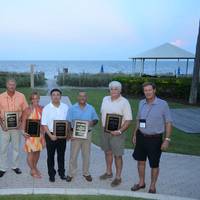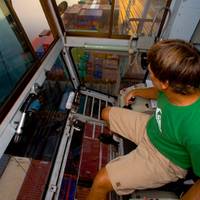The Complicated Business of Marine Construction Worker Claims

The right insurance policy could help you stay above water after a workplace incident. The day-to-day job of marine construction workers has many potential hazards. While restoring shorelines, dredging harbors, repairing bridges and building docks, they often operate heavy machinery. Manning cranes, forklifts and excavators day or night, it is not uncommon to work in sweltering heat, freezing cold temperatures and an array of other challenging weather conditions. With all of this in mind…
China's Acquisition of Piraeus Port a Booster for Greek Economy?
Greece has formally signed an agreement to sell a 67% stake in the Port of Piraeus to Chinese shipping company China Cosco Holding Co. Under the deal, COSCO, the fourth-largest container shipping firm and second-largest port operator in the world, will pay the cash-strapped country 368.5 million euros (418.8 million U.S. dollars), and also promises to invest another 350 million euros (398.9 million dollars) over the next decade in infrastructure work at the port. In five years of operation, COSCO aims to make the Piraeus port the south gate of the China-Europe land-sea express to speed up transportation between China and Europe, said Xu.
Manage and Mitigate Risk on the Water

Early in the morning on August 29, 2005, Hurricane Katrina struck the Golf Coast of the United States. Hurricane Katrina was the worst insured loss event in the history of insurance anywhere in the world. It was bigger than 9/11. It was bigger than the earthquake and tsunami in Japan. Hundreds of thousands of people in Louisiana, Mississippi and Alabama were displaced from their homes. Barges were picked up by the waves and slammed onto shore, while some were moved so far inland that they ended up on top of freeways.
USCG Guidance and Reporting Marine Casualties

U.S. Coast Guard Guidance Helps to Bring some Clarity to the Debate. In July 2015, the U.S. Coast Guard released Navigation and Vessel Inspection Circular 01-15 (“NVIC”), titled Marine Casualty Reporting Procedures Guide with Associated Standard Interpretations. The purpose of the NVIC is to assist vessel owners and operators in understanding the marine casualty reporting requirements, which many in the industry think are about as clear as mud. Confusion as to what constitutes a marine casualty and what incidents need to be reported has persisted in the marine industry for years.
AEU Presents Safety Awards

The American Equity Underwriters, Inc. (AEU) presented its 2014 Safety Awards at the annual American Longshore Mutual Association, Ltd. (ALMA) Conference on July 19, 2015, in Key Biscayne, Fla. AEU, which provides solutions for workers’ compensation coverage under the Longshore and Harbor Workers’ Compensation Act, each year gives awards to the best performing ALMA members nationwide based on the rate and severity of accidents for the calendar year. The award is an acknowledgement that these companies are leaders in the most important aspect of business operations…
Medicare Set Asides – and You

Jones Act and LHWCA employers must protect Medicare’s interest or pay the price. It may be boring, but it is important. Read and heed. Attention maritime entities that employ Jones Act Seamen covered by liability insurance, including self-insurance, or land based employees covered by no-fault insurance or any workers’ compensation act: you MUST protect Medicare interests. These plans are also known as Non-Group Health Plans (NGHP). Failure could mean a fine of $1,000.00 per day per claim or liable to reimburse Medicare for payments made to a claimant.
Risk Management
The old expression about getting one’s sea legs speaks to how different life can be in the ocean marine environment. Those who spend most of their time on land often need to adjust to the rhythms that are second nature to old sea hands. Similarly, any company that operates both on land and water needs to adjust its risk management strategies to account for exposures in both arenas. That can range from something as simple as making sure land-based workers have the right protective equipment when they move to the waterfront, to something as complex as coordinating insurance coverage to minimize the possibility of gaps or unexpected liabilities.
Veteran Maritime Attorney Changes Sides

George M. Jones joins Los Angeles Maritime Law offices of Charles D. Naylor. An experienced trial attorney, Mr. Jones brings to the firm more than 20 years of maritime law experience. “I’ve known George for almost 20 years, and amongst fellow maritime lawyers, he has a reputation for being one of the best – for his legal expertise, character and integrity,” said maritime attorney Charles D. Naylor. At the Law Offices of Charles D. Naylor, Mr. Jones is leading the firm’s Longshore and Harbor Workers’ Compensation Act (LHWCA) claims team…
Marine Construction:

Protecting Contractors As They Enter New Waters. As the economic recovery continues to sputter along, construction companies eager to land any available projects have found themselves bidding outside their normal scope of work. Maritime construction is one such industry that has seen an increase in contractors who may not typically work on marine-related projects, thereby increasing the likelihood that individual projects may fall outside their skill set. While contracts in marine construction present opportunities for income…
Marine Construction Policy Builds Expertise, Service into Coverage

Construction is a complex business. Equipment can break down; employees can be injured; a project can go awry in unexpected ways. Add a marine element to the work underway, and the pitfalls that a contractor must navigate to manage risk become even more challenging. Marine contractors have long understood that they need specialized coverage and have sought out ocean marine insurance carriers with the expertise to help them. Each project they bid on, however, can come with a variety of special requirements.
Great Lakes Shipyard Receives Safety Award
Great Lakes Shipyard, Cleveland, Ohio, has received the 2009 – 2010 Industry Leader Safety Award from the Signal Mutual Indemnity Association. This is the second time in recent years that the Great Lakes Shipyard was chosen to receive this award because of their outstanding safety performance with no “lost time” accidents. The shipyard’s commitment to safety is not new. The previous outstanding safety award was presented in 2004 - 2005. The company attributes its successful performance over the years to its extensive internal safety policies and training programs. Signal is the largest provider of Longshore and Harbor workers compensation insurance benefits in the United States.
Seaman or Longshoreman: The Zone of Uncertainty

Historically in our industry, there has been a clear dichotomy between companies whose employees are seamen that are covered by the Jones Act and those that are longshoremen and covered by the Longshore and Harbor Workers’ Compensation Act (LHWCA). The difference was very simple, Jones Act employers and their seamen were responsible for vessel-based duties and operations. Longshore employers hired longshoremen that were land-based although they performed a portion of their duties aboard vessels.
Key Elements of Yacht Insurance, Q&A

Accidents happen. That comes as no surprise to those in the insurance industry, but what may be a surprise is the fact that the majority of maritime accidents occur in good weather with perfect visibility. In the following Q&A, Joseph McNulty, founding member of Carroll McNulty & Kull, joins Richard Furman and John Orzel, members of the same law firm, in a discussion on the key elements of marine insurance and what underwriters and claims professionals need to know about federal laws governing the maritime industry. Q. Let's start at the beginning. What is marine insurance?
State-law tort claim not preempted by LHWCA
The US Court of Appeals for the Fifth Circuit ruled that a state-law tort claim by a shipyard worker against a vessel owner is not necessarily preempted by the Longshore and Harbor Workers’ Compensation Act (LHWCA). In the instant case, was injured while fabricating a pontoon extension for defendant’s vessel, which was moored 200 feet away from plaintiff’s worksite. After receiving LHWCA benefits from his employer, plaintiff sued defendant under state and federal law, alleging that defendant had assumed substantial control over work on the pontoons and had failed to exercise due care to ensure observation of proper safety practices. The trial court dismissed the actions against defendant as preempted by the LHWCA.
Location is determined at time of injury
The U.S. Court of Appeals for the Fifth Circuit ruled that, in a case brought under the Longshore and Harbor Workers’ Compensation Act (LHWCA), the status of the location where the injury was incurred is determined at the time of the injury. In the instant case, plaintiff welder was injured while on a construction project. Two barge slips were being built. The injury was incurred on the land side of the project, before the remaining earthwork had been removed to allow water to enter. The court held that, since the site where the injury was incurred was not serving and had not served a maritime purpose, the LHWCA did not apply. Tarver v. Bo-Mac Contractors, Inc., No. 03-61028 (5th Cir. - HK Law)
How to Indentify a Jones Act Seaman
By Jeffrey S. The maritime law community is awaiting the next pronouncement by the U.S. Supreme Court pertaining to the definition of a Jones Act seaman. In February, the high court announced that it would review the decision of the First Circuit Court of Appeals in Stewart v. Dutra Construction Co., Inc. The definition of seaman has proven to be a nagging problem; this will be the fifth time since 1991 that the Justices have tackled some aspect of the question. Most injured maritime workers would prefer to pursue recovery as a "seaman". There are several reasons for this. First and foremost, the damages recoverable under the Jones Act are not limited to lost wages and benefits, but also include an important component for "pain and suffering".
LHWCA Statute of Limitations
In an unpublished decision, the U.S. and Harbor Workers' Compensation Act (LHWCA) does not commence to run until the claimant knew or had reason to know that the injury was likely to impair his earning capacity. back while working in a shipyard in 1993. He was temporarily out of work, but then worked regularly for four years, but while seeing a doctor, who noted that the condition was gradually worsening. underwent a nerve block procedure and then filed a disability claim. Defendant shipyard contended that plaintiff knew more than one year previously that his back injury would impair his earning capacity. Over the vigorous objection of one judge…
NMEA Announces Annual Meeting Schedule
The National Marine Electronics Association (NMEA) will hold its annual convention on Tuesday, October 22 through Sunday, October 27, 2002 at the beautiful Sanibel Harbour Resort and Spa in Ft. Myers, Fla. The convention will feature a variety of the marine electronics industry’s top speakers. The exposition will feature new product introductions from over 45 of the leading electronics manufacturers from the United States and around the world. Along with traditional annual meetings, Larry Anderson, chairman of the NMEA standards committee, will conduct a dealers-only training session on the NMEA 2000. Insurance guru Ian Greenway will hold an insurance workshop regarding longshore and harbor workers.
LHWCA late payment award triggers attorneys’ fees
The U.S. Court of Appeals for the Fourth Circuit ruled that, under the Longshore and Harbor Workers’ Compensation Act (LHWCA), an employee who successfully prosecutes a claim for late payment of compensation is entitled to receipt of attorneys’ fees. In the instant case, the claimant and the employer settled the initial compensation claim. The employer was unable to deliver, within 10 days, to the claimant a payment of 20% of the total amount due, despite its alleged good faith effort. The claimant then sought and obtained a late payment award. The claimant then sought attorneys’ fees related to obtaining the late payment award. The employer argued that the late payment award was a penalty…
Union President Not Engaged in Maritime Employment Under LHWCA
The U.S. Court of Appeals for the Fourth Circuit ruled that a union president is not engaged in maritime employment for purposes of the Longshore and Harbor Workers’ Compensation Act (LHWCA). In the instant case, the claimant filed an application in 2000 for benefits under the LHWCA, alleging hearing loss, which he ascribed to his work as a container repair mechanic. Claimant ceased work as a mechanic in 1996 when he became a full-time president of Local 1970 of the International Longshoremen’s Association. His work as union president required his occasional presence at a marine terminal, but most of his time was spent in an office or at home.
LHWCA Awards for Multiple Disabilities
The U.S. Court of Appeals for the Ninth Circuit issued a decision on how awards under the Longshoremen and Harbor Workers’ Compensation Act (LHWCA) should be calculated in cases involving multiple disabilities. In the instant case, a longshoreman was injured in 1979 and awarded permanent partial disability. Following a subsequent injury, he was found to be entitled to permanent total disability. The court ruled that, since the two injuries were separate, neither award is entitled to an offset and the longshoreman may collect both awards. Stevedoring Services of America v. Price, No. 02-71207 (9th Cir.) (HK Law)
LHWCA Settlement Unenforceable
The U.S. Court of Appeals for the Ninth Circuit ruled that a written settlement agreement involving a claim under the Longshoremen and Harbor Workers’ Compensation Act (LHWCA) is unenforceable unless actually signed by claimant. In the instant case, plaintiff’s decedent had filed a claim under the LHWCA. His attorney reached a settlement with the employer’s attorney, which was reduced to writing. Plaintiff’s decedent reviewed the document and approved it, but died before actually signing it. Plaintiff signed the settlement agreement as the representative of decedent’s estate. The court held that enforcement of a LHWCA settlement agreement depends on submission of a document containing the settlement information and the signatures of the actual parties. O’Neil v. Bunge Corp., No.
An Exception to the Divers' Exception?
By James P. Nader & Rudolph F. An occupational study estimates that the number of commercial diving positions nationwide will grow to an anticipated total of 5,000 positions over the next decade. For the uninitiated, the focus of these commercial divers spans the gamut from extensive inspection of hulls and pipelines to the construction and repair of underwater structures to the demolition and removal of underwater obstacles, and onwards to the search and rescue of people and missing objects. While the commercial diving industry is certainly diverse, every diver shares a certain level of risk of injury when entering the water. Therefore…





